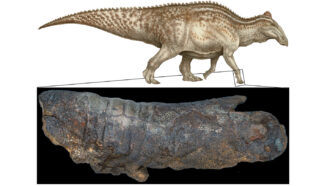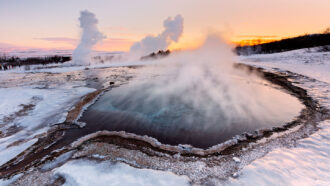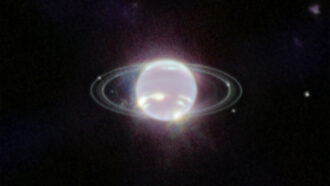All Stories
-
 Physics
PhysicsScientists Say: Neutron
Neutrons are one of the main building blocks of atoms and have no electric charge.
-
 Materials Science
Materials ScienceThese fabrics change color as they stretch
Stretchy, color-shifting cloth may lead to new art, fashions and sensors. A century-old Nobel-prize-winning invention served as its inspiration.
-
 Health & Medicine
Health & MedicineHow wriggling, blood-eating parasitic worms alter the body
Parasitic worms eat blood and make people sick, but they may also help prevent or treat some diseases.
-
 Tech
TechHow to turn your hobby into a seriously cool science project
This year’s Broadcom MASTERS finalists were inspired by their love of painting, horseback riding and other pastimes.
-
 Fossils
FossilsDinosaur ‘mummies’ may not be as rare as once thought
Bite marks found on a fossilized dino show that skin can be preserved even when a carcass is not immediately smothered by sediment.
By Jake Buehler -
 Animals
AnimalsLet’s learn about parasites that create zombies
Some parasites turn their victims into mindless puppets that do the parasites’ bidding, even at the cost of their own lives.
-
 Earth
EarthScientists Say: Pole
A pole is either of two opposite ends of a molecule, magnet, battery, planet or other object.
-
 Animals
AnimalsAnalyze This: Octopuses may use favorite arms for grabbing meals
Understanding how octopuses control all their arms could provide clues for engineers building soft robots.
-
 Science & Society
Science & SocietyWhat’s the fun in fear? Science explores the appeal of scary movies
On its face, the appeal of horror doesn’t make much sense. But scientists are starting to uncover who’s most likely to enjoy scary films and why.
-
 Physics
PhysicsExplainer: What are the different states of matter?
Most people know solids, liquids and gases — but what about the four other states of matter?
-
 Planets
PlanetsCheck out the first direct look at Neptune’s rings since the ’80s
The Voyager 2 spacecraft took the first pics of Neptune’s rings 33 years ago. Now, NASA’s James Webb telescope is providing a more detailed view of them.
-
 Space
SpaceThis physicist hopes to shake up our understanding of space
Adeene Denton uses a combination of geology, astrophysics and coding to better understand the structure of planets.